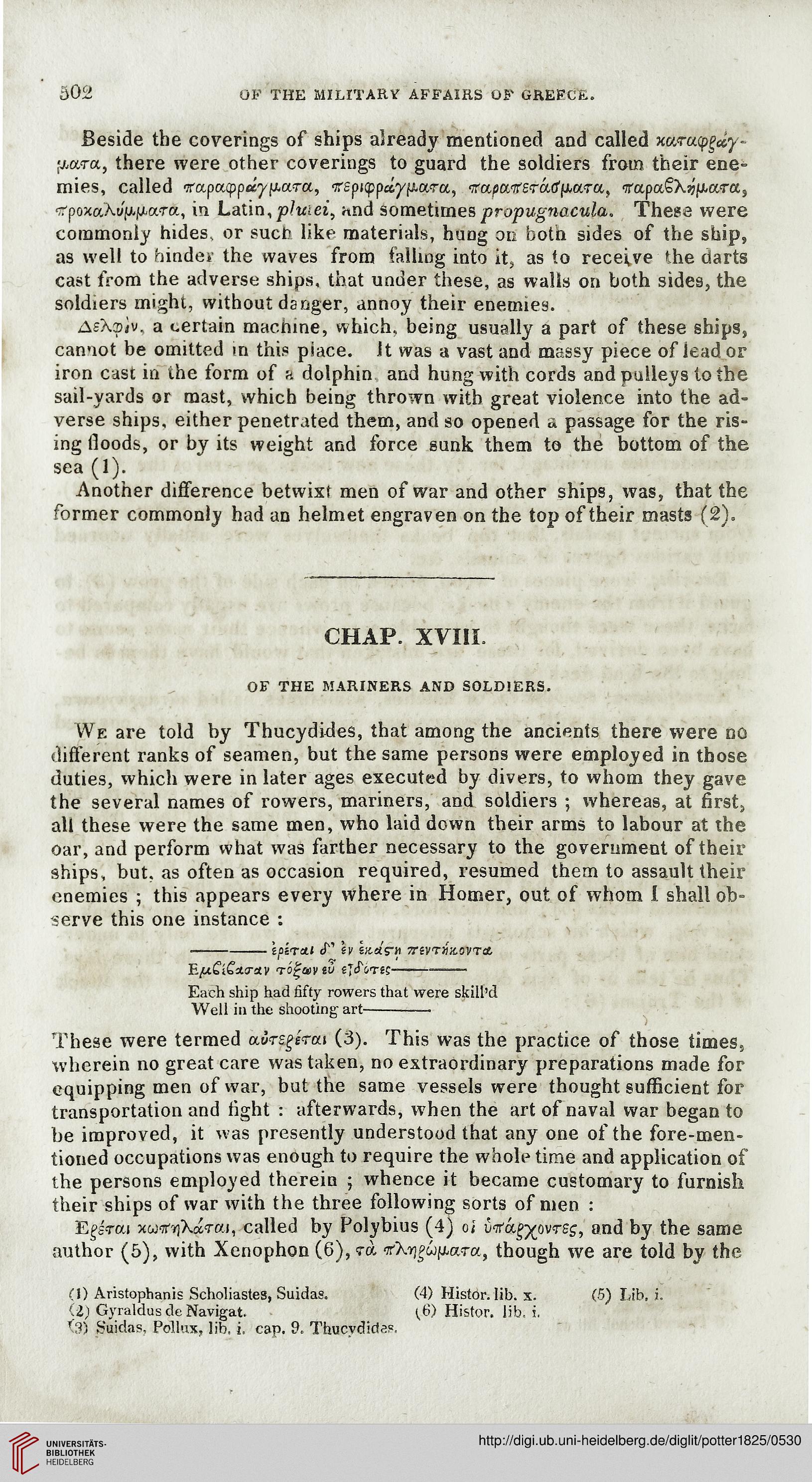502
of the military affairs of grefck.
Beside the coverings of ships already mentioned and called xuruygeiy-
Ijmtu, there were other coverings to guard the soldiers from their ene-
mies, called Tapctippay/AaTa, TEpi<j3p«y|xa<ra, <zapu.rfe!ra<ifi,a.rut irapa§X»J|xa<ra,
cpoxaAt/fji.^a'ra, in Latin, pluiei, and sometimes propugnacula. Thesa were
commonly hides, or suet? like materials, hung 012 both sides of the ship,
as well to hinder the waves from falling into it, as to receive the darts
cast from the adverse ships, that under these, as walls on both sides, the
soldiers might, without danger, annoy their enemies.
AsAaiv. a certain machine, which, being usually a part of these ships,
cannot be omitted in this place. It was a vast and massy piece of lead or
iron cast in the form of h dolphin and hung with cords and pulleys to the
sail-yards or mast, which being thrown with great violence into the ad-
verse ships, either penetrated them, and so opened u passage for the ris-
ing Hoods, or by its weight and force sunk them to the bottom of the
sea (1).
Another difference betwixt men of war and other ships, was, that the
former commonly had an helmet engraven on the top of their masts (2).
CHAP. XVIII.
of the mariners and soldiers.
We are told by Thucydides, that among the ancients there were no
different ranks of seamen, but the same persons were employed in those
duties, which were in later ages executed by divers, to whom they gave
the several names of rowers, mariners, and soldiers ; whereas, at first,
all these were the same men, who laid down their arms to labour at the
oar, and perform what was farther necessary to the government of their
ships, but, as often as occasion required, resumed them to assault their
enemies ; this appears every where in Homer, out of whom I shall ob-
serve this one instance :
--ip'iTtLi £" h izds-h TTiyrtix-ovrtt
Each ship had fifty rowers that were skill'd
Well i» the shooting- art-.
These were termed adr^kui (3). This was the practice of those times,
wherein no great care was taken, no extraordinary preparations made for
equipping men of war, but the same vessels were thought sufficient for
transportation and fight : afterwards, when the art of naval war began to
be improved, it was presently understood that any one of the fore-men-
tioned occupations was enough to require the whole time and application of
the persons employed therein ; whence it became customary to furnish
their ships of war with the three following sorts of men :
E^sVou xwffK]AixTHi, called by Polybius (4) oi vifa^ovrsg, and by the same
author (5), with Xenophon (6), «u ifX^u^ara, though we are told by the
(1) Aristophanis Scholiastes, Suidas. (4) Mistor. lib. s. (5) Lib, i.
(i) Gyraldus de Navigat. ■ t,t>) Histor. lib, i,
<3) Suidas, Pollux, lib, i, cap. 9. Thucydide*.
of the military affairs of grefck.
Beside the coverings of ships already mentioned and called xuruygeiy-
Ijmtu, there were other coverings to guard the soldiers from their ene-
mies, called Tapctippay/AaTa, TEpi<j3p«y|xa<ra, <zapu.rfe!ra<ifi,a.rut irapa§X»J|xa<ra,
cpoxaAt/fji.^a'ra, in Latin, pluiei, and sometimes propugnacula. Thesa were
commonly hides, or suet? like materials, hung 012 both sides of the ship,
as well to hinder the waves from falling into it, as to receive the darts
cast from the adverse ships, that under these, as walls on both sides, the
soldiers might, without danger, annoy their enemies.
AsAaiv. a certain machine, which, being usually a part of these ships,
cannot be omitted in this place. It was a vast and massy piece of lead or
iron cast in the form of h dolphin and hung with cords and pulleys to the
sail-yards or mast, which being thrown with great violence into the ad-
verse ships, either penetrated them, and so opened u passage for the ris-
ing Hoods, or by its weight and force sunk them to the bottom of the
sea (1).
Another difference betwixt men of war and other ships, was, that the
former commonly had an helmet engraven on the top of their masts (2).
CHAP. XVIII.
of the mariners and soldiers.
We are told by Thucydides, that among the ancients there were no
different ranks of seamen, but the same persons were employed in those
duties, which were in later ages executed by divers, to whom they gave
the several names of rowers, mariners, and soldiers ; whereas, at first,
all these were the same men, who laid down their arms to labour at the
oar, and perform what was farther necessary to the government of their
ships, but, as often as occasion required, resumed them to assault their
enemies ; this appears every where in Homer, out of whom I shall ob-
serve this one instance :
--ip'iTtLi £" h izds-h TTiyrtix-ovrtt
Each ship had fifty rowers that were skill'd
Well i» the shooting- art-.
These were termed adr^kui (3). This was the practice of those times,
wherein no great care was taken, no extraordinary preparations made for
equipping men of war, but the same vessels were thought sufficient for
transportation and fight : afterwards, when the art of naval war began to
be improved, it was presently understood that any one of the fore-men-
tioned occupations was enough to require the whole time and application of
the persons employed therein ; whence it became customary to furnish
their ships of war with the three following sorts of men :
E^sVou xwffK]AixTHi, called by Polybius (4) oi vifa^ovrsg, and by the same
author (5), with Xenophon (6), «u ifX^u^ara, though we are told by the
(1) Aristophanis Scholiastes, Suidas. (4) Mistor. lib. s. (5) Lib, i.
(i) Gyraldus de Navigat. ■ t,t>) Histor. lib, i,
<3) Suidas, Pollux, lib, i, cap. 9. Thucydide*.





